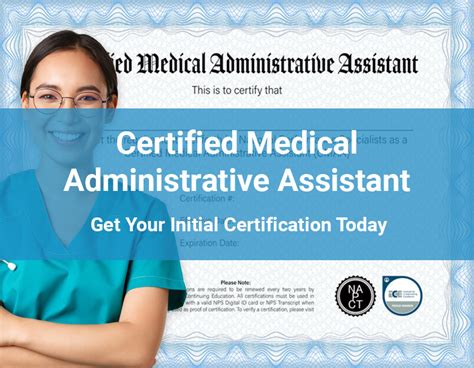Intro
Discover the rewarding world of medical administrative assistants. Learn about the roles, responsibilities, and benefits of medical administrative assistant positions, including job outlook, salary ranges, and required skills. Explore how this career choice combines administrative expertise with healthcare knowledge, offering a fulfilling and in-demand profession.
The healthcare industry is one of the fastest-growing sectors in the world, and it's not just doctors and nurses who are in high demand. Medical administrative assistants play a vital role in ensuring the smooth operation of healthcare facilities, and their importance cannot be overstated. If you're considering a career in healthcare, but don't want to be directly involved in patient care, a medical administrative assistant position could be an excellent choice.
Medical administrative assistants are the backbone of any healthcare facility, providing administrative support to healthcare professionals, managing patient records, and handling a wide range of administrative tasks. They are responsible for ensuring that the day-to-day operations of the facility run smoothly, and that patients receive the best possible care. With the healthcare industry continuing to grow, the demand for medical administrative assistants is expected to increase, making it a rewarding and stable career choice.

What Does a Medical Administrative Assistant Do?
Medical administrative assistants, also known as medical office assistants or medical secretaries, perform a wide range of administrative tasks in healthcare facilities. Their duties may include:
- Managing patient records and ensuring that they are accurate and up-to-date
- Handling patient registration and admissions
- Answering phone calls and responding to patient inquiries
- Scheduling appointments and managing calendars
- Processing medical billing and insurance claims
- Maintaining confidentiality and adhering to HIPAA regulations
- Providing administrative support to healthcare professionals
Key Skills and Qualities
To be successful as a medical administrative assistant, you'll need to possess certain skills and qualities, including:
- Excellent communication and interpersonal skills
- Strong organizational and time management skills
- Ability to maintain confidentiality and handle sensitive information
- Basic computer skills and knowledge of medical software
- Ability to work well under pressure and prioritize tasks
- Strong attention to detail and accuracy
Education and Training
While a degree is not always required to become a medical administrative assistant, having one can certainly be beneficial. Many community colleges and vocational schools offer programs in medical administration, which can provide you with the necessary skills and knowledge to succeed in this role.
These programs typically include coursework in:
- Medical terminology
- Anatomy and physiology
- Medical billing and insurance
- Medical records management
- Computer applications and software

Job Outlook and Salary
The job outlook for medical administrative assistants is excellent, with the Bureau of Labor Statistics predicting a 22% increase in employment opportunities through 2026. This is much faster than the average for all occupations.
According to the Bureau of Labor Statistics, the median annual salary for medical administrative assistants was $34,800 in May 2020. However, salaries can vary depending on factors such as location, experience, and employer.
Salary Ranges
Here are some approximate salary ranges for medical administrative assistants in different industries:
- Hospitals: $30,000 - $45,000 per year
- Physician offices: $28,000 - $40,000 per year
- Nursing homes: $25,000 - $35,000 per year
- Medical clinics: $30,000 - $45,000 per year
Certification and Professional Development
While certification is not required to become a medical administrative assistant, having one can certainly be beneficial. The Certified Medical Administrative Assistant (CMAA) credential is offered by the National Healthcareer Association (NHA) and demonstrates that you have the necessary skills and knowledge to succeed in this role.
In addition to certification, many medical administrative assistants choose to pursue professional development opportunities, such as continuing education courses and workshops, to stay up-to-date on the latest developments in medical administration.

Specializations
Medical administrative assistants can specialize in a particular area of medical administration, such as:
- Medical billing and coding
- Medical records management
- Medical transcription
- Medical office management
Specializing in a particular area can help you advance in your career and increase your earning potential.
Medical Billing and Coding
Medical billing and coding is a specialized area of medical administration that involves assigning codes to diagnoses and procedures for billing purposes. Medical billers and coders must have a strong understanding of medical terminology, anatomy, and coding systems.
Medical Records Management
Medical records management involves maintaining and managing patient records, ensuring that they are accurate and up-to-date. Medical records managers must have a strong understanding of medical terminology, anatomy, and confidentiality regulations.

Conclusion
Medical administrative assistants play a vital role in ensuring the smooth operation of healthcare facilities, and their importance cannot be overstated. With the healthcare industry continuing to grow, the demand for medical administrative assistants is expected to increase, making it a rewarding and stable career choice.
If you're considering a career in healthcare, but don't want to be directly involved in patient care, a medical administrative assistant position could be an excellent choice. With the right education and training, you can succeed in this role and enjoy a rewarding and challenging career.
We encourage you to share your thoughts and experiences in the comments section below. Have you considered a career as a medical administrative assistant? What do you think are the most important skills and qualities for success in this role?
What is the average salary for a medical administrative assistant?
+The average salary for a medical administrative assistant is around $34,800 per year, according to the Bureau of Labor Statistics.
Do I need a degree to become a medical administrative assistant?
+A degree is not always required to become a medical administrative assistant, but having one can certainly be beneficial. Many community colleges and vocational schools offer programs in medical administration.
What are the most important skills and qualities for a medical administrative assistant?
+Excellent communication and interpersonal skills, strong organizational and time management skills, and attention to detail are some of the most important skills and qualities for a medical administrative assistant.
